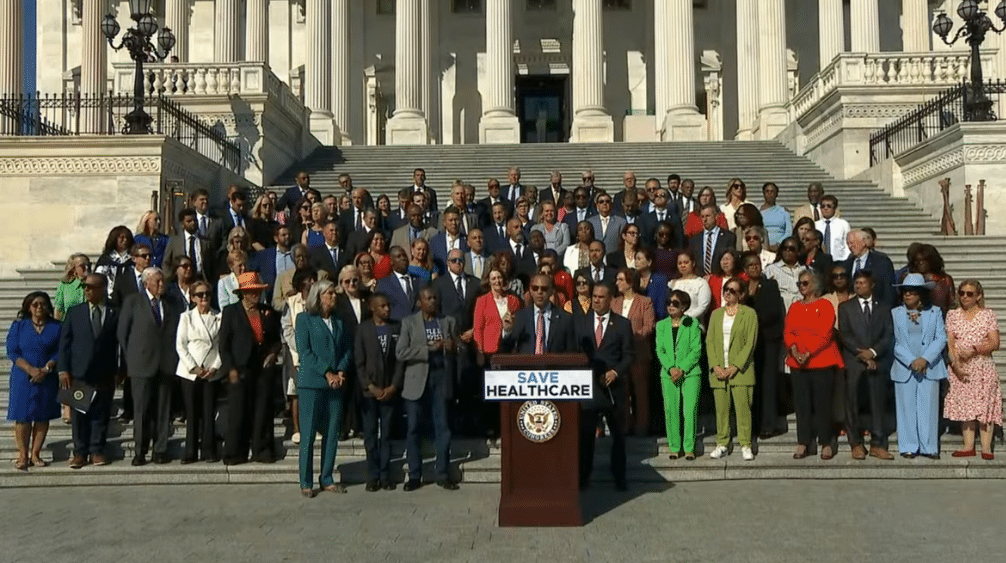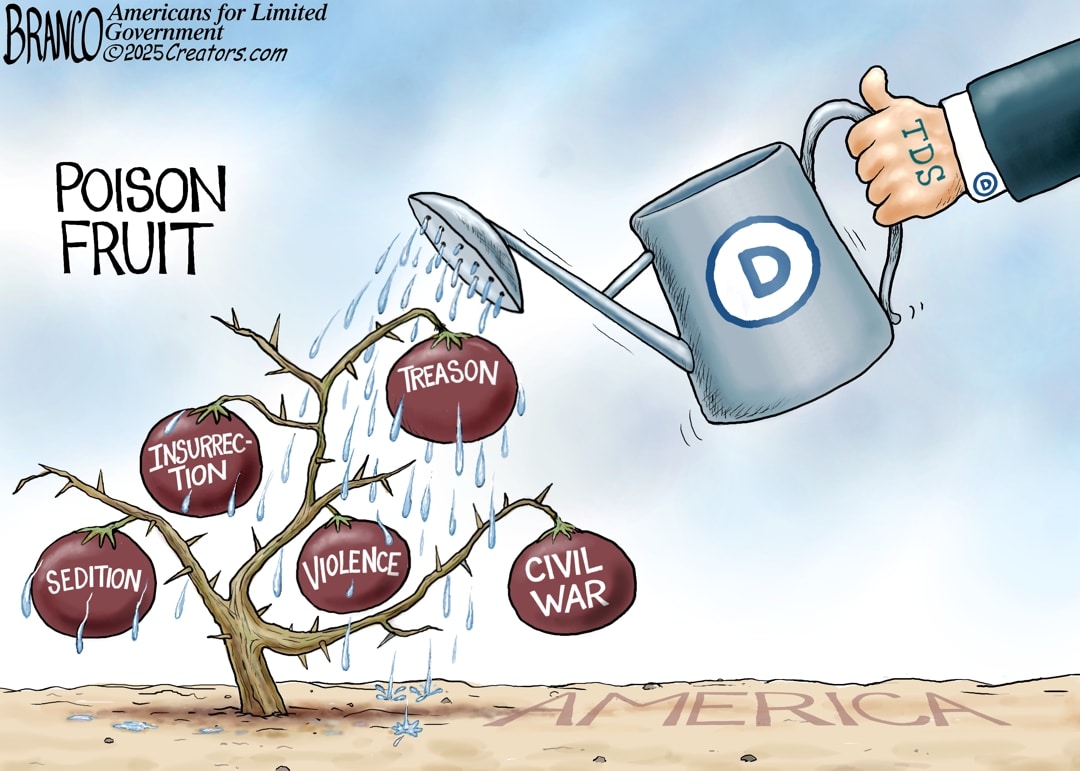
Nov. 25, 2025
Permission to republish original opeds and cartoons granted.
Did The Shutdown Cause A Recession? What Trump’s Second Term Approval And Consumer Confidence Show.
|

|
|
On Oct. 1, Senate Democrats refused to approve a continuing resolution to keep the government open and then set the record for the longest government shutdown in history of 43 days when it ended on Nov. 12. The entire time, President Donald Trump, Treasury Secretary Scott Bessent and other administration officials were warning that the longer the shutdown went on, the worse it might get for the economy. President Trump’s approval rating also suffered during the shutdown, starting a 44.8 percent approval and 53 percent disapproval in the national average of polls compiled by RealClearPolling.com on Sept. 30 to now 43 percent approval and 55 percent disapproval. Besides typical political volatility, a recession can also have a very big impact on approval. Jimmy Carter had a recession in 1980 and went underwater in approval, never to recover and was defeated by Reagan. Reagan had a recession in 1982 and went underwater, but recovered and went on to be reelected in 1984. George H.W. Bush also had a recession, went underwater in approval and then was defeated by Clinton. President Trump in his first term had the Covid recession in 2020, went underwater in approval and was defeated by Joe Biden. Joe Biden himself went underwater his first year in as inflation skyrocketed and he botched the Afghanistan military withdrawal, and then it peaked in 2022 along with the inflation, and then he was ousted by his own party in 2024, which went on to be defeated by Trump. During all of those recessions and slowdowns, consumer confidence measured by the University of Michigan had collapsed and hit a bottom. Now, consumer confidence came in at just 51 in November from the University of Michigan, one of the lowest readings on record. Whether the government shutdown of 2025 only made things worse, we’ll have a better idea when we finally get up to date post-shutdown economic data for November next month. How bad was the damage?
|
Did The Shutdown Cause A Recession? What Trump’s Second Term Approval And Consumer Confidence Show.

By Robert Romano
On Oct. 1, Senate Democrats refused to approve a continuing resolution to keep the government open and then set the record for the longest government shutdown in history of 43 days when it ended on Nov. 12.
The entire time, President Donald Trump, Treasury Secretary Scott Bessent and other administration officials were warning that the longer the shutdown went on, the worse it might get for the economy thanks to displaced federal workers, slowdowns in air travel, the disruption of food stamps and so forth.
During the shutdown, Republicans lost the off-year elections in New Jersey and Virginia on Nov. 4 as expected — that’s what the polls showed even before the shutdown —as Democrats were more motivated to vote than Republicans with a Republican in the White House.
President Donald Trump’s approval rating also suffered during the shutdown, starting a 44.8 percent approval and 53 percent disapproval in the national average of polls compiled by RealClearPolling.com on Sept. 30 to now 43 percent approval and 55 percent disapproval.
The truth is, the President’s approval rating has been dipping all year long, which sometimes happens in a president’s second term.
Call it the second term hangover. Looking back at Gallup presidential approval data — the longest dataset — you can see it in the first year of George W. Bush and Barack Obama’s second terms. Obama recovered and ended positive, but Bush never did, having a recession his final year.
It also briefly happened during Ronald Reagan’s second term during the Iran Contra scandal as his approval briefly went underwater but he still ended positive. And Bill Clinton had a positive approval rating throughout his entire second term.
Besides typical political volatility, as noted above in the case of Bush, a recession can also have a very big impact on approval.
Jimmy Carter had a recession in 1980 and went underwater in approval, never to recover and was defeated by Reagan.
Reagan had a recession in 1982 and went underwater, but recovered and went on to be reelected in 1984.
George H.W. Bush also had a recession, went underwater in approval and then was defeated by Clinton.
President Trump in his first term had the Covid recession in 2020, went underwater in approval and was defeated by Joe Biden.
Joe Biden himself went underwater his first year in as inflation skyrocketed and he botched the Afghanistan military withdrawal, and then it peaked in 2022 along with the inflation, and then he was ousted by his own party in 2024, which went on to be defeated by Trump.
During all of those recessions and slowdowns, consumer confidence measured by the University of Michigan had collapsed and hit a bottom. In May 1980, consumer confidence hit a low of 53.6 during that recession, and Carter lost. In April 1982, it fell to 64.7 in that recession. In December 1990, it fell to 65.1 and in February 1992, it fell to 68.2 in that recession, and Bush lost. In 2001, there was a recession, and consumer confidence fell to 85.1 in December 2001, and then again to 80 in March 2003 as the Iraq War began before recovering in time for 2024. In 2008, during the financial crisis, consumer confidence collapsed to 57.7 in December 2008 as Republicans were being knocked out of power. In 2020, during the Covid recession, it collapsed to 74.1 in June 2020, and Trump lost. And in 2022, during the inflation, it collapsed to 53.2, and Biden and his replacement Kamala Harris lost.
Now, consumer confidence came in at just 51 in November from the University of Michigan, one of the lowest readings on record. Consumer confidence usually bottoms during times of economic distress and recessions. The last time it was this low was when inflation was peaking the summer of 2022 under Biden. In polls during Biden’s term, Americans consistently stated they thought the U.S. was in a recession.
Correlating both approval and consumer confidence from 1977 to present, the pattern is during recessions, consumer confidence craters and disapproval spikes or peaks. Trump has both of those things being true — very low consumer confidence and high disapproval — right now.
The good news for the President is — whether a recession or just a slowdown — is the lack of confidence is occurring in his first year and looking at the past eight presidencies, is actually somewhat normal. Now, the current readings might not bode well for the Congressional midterms looming in 2026 if the weakness continues. But as the economy improves, by 2028, the picture could look decidedly different. Turnarounds happen.
The truth is, thanks to the post-Covid inflation slowing down the economy and maxing out household credit, unemployment has risen by 1.85 million since January 2023 to its current level of 7.6 million, meaning what the American people are reporting now via disapproval and sentiment has been years in the making.
Whether the government shutdown of 2025 only made things worse, we’ll have a better idea when we finally get up to date post-shutdown economic data for November next month. How bad was the damage? We’ll know soon. Stay tuned.
Robert Romano is the Executive Director at Americans for Limited Government Foundation.
To view online: https://dailytorch.com/2025/11/did-the-shutdown-cause-a-recession-what-trumps-second-term-approval-and-consumer-confidence-show/
Cartoon: Poison Fruit
By A.F. Branco

Click here for a higher level resolution version.
To view online: https://dailytorch.com/2025/11/cartoon-poison-fruit/
